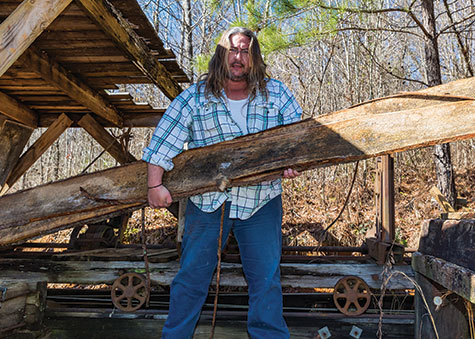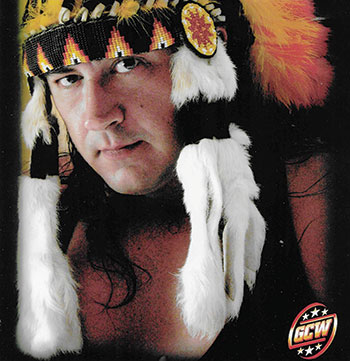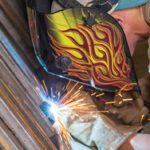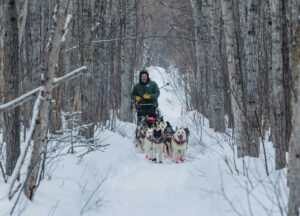
Wrestler, sawmill operator, Dad – Answering the call
Story by Elaine Hobson Miller
Photos by Michael Callahan
Cliff Horsley waits behind the curtain while the ring announcer pumps up the audience. He thinks about the wrestling matches he watched on television and at Birmingham’s Boutwell Auditorium when he was growing up. He thinks about his Mohawk/Cherokee heritage, and starts slipping into character as Chief Thunderhorse, the Silent Giant with the Hands of Stone, who stands for what’s right and good.
Wearing a headdress, arm bands and coordinating black-and-yellow tights, he listens to the fans chanting, “Chief! Chief! Chief!” and hears their whoops and war cries. He holds his head up high, stiffens his back, and slips into the role he will play tonight. Once the introductory music starts, and Horsley walks into the spotlight and crawls under the ring ropes, the transformation is complete. He is no longer Cliff Horsley, Springville resident, sawmill operator, single father of four. He is Chief Thunderhorse, Oklahoma native, representative of the Cherokee Nation, the Real American.
“In the ring, you get to step out and be the character you dreamed of being as a kid,” says Horsley. “It’s the satisfaction of knowing you’ve accomplished what you’ve always dreamed about growing up and watching it, saying, ‘One day I’ll do that.’ It’s knowing you’ve accomplished that, with a lot of hard work and perseverance.”
Being a wrestler was all Cliff Horsley ever wanted. He wrestled at Pinson High School, where he also played football, then turned professional at the age of 22. For the first few years, he used his own name as he wrestled for various entities at the Pell City Civic Center and other Southeastern venues. One day, the head of Global Championship Wrestling told him he needed an Indian and dubbed him Chief Thunderhorse, a part ready-made for Horsley, who fashions arrowhead necklaces for friends. So for the next 10 years, he played the part, while living a gypsy life in a motorhome that he could move any time he wanted to.
 He pushed through his injuries, like the wrist that was broken twice and never healed, the ribs he popped out of his sternum, and the hernia he developed in his lower belly. “The match has to go on,” he says. But it wasn’t the body slams, the scorpion leg locks, the bad-guy punches or the cross-body drops as his opponents fell on him that finally took their toll and pulled him away from the wrestling ring. It was the kids he had never really known.
He pushed through his injuries, like the wrist that was broken twice and never healed, the ribs he popped out of his sternum, and the hernia he developed in his lower belly. “The match has to go on,” he says. But it wasn’t the body slams, the scorpion leg locks, the bad-guy punches or the cross-body drops as his opponents fell on him that finally took their toll and pulled him away from the wrestling ring. It was the kids he had never really known.
“In 1996, when they were one-and-a-half years old and newborn, their mom left with them,” he says of his oldest son and daughter. “For 15 years, I did not know their whereabouts. I had no money for a private detective.” To add insult to injury, the man their mother married took on Cliff’s identity, with the aid of one of Cliff’s old driver’s licenses that she had kept.
Then one day, out of the blue, the Chilton County Department of Human Resources (DHR) called. “They said here’s your kids, now you need a stable income,” Horsley says. “They started demanding structure and order.”
He didn’t have to think twice.
“My kids were teenagers, they demanded my time,” he says.
He was already supplementing his income with a portable sawmill, but he had to sell it to keep his head above water for a while. “I had to make child support payments, which went to DHR because the kids had been in their custody for two years.”
His grandfather had been a sawyer and cabinet maker, so working with wood was in his blood. It was something he knew he could do without his children having “a broke-up daddy and no paycheck,” he explains.
He admits that it was tough making the transition from his bachelor lifestyle and the role of Chief Thunderhorse to the role of Daddy and the restrictions that came with it. “But I knew what it was gonna take, me walking away from that business to focus on them, that’d I’d have to give my children the 110% I was giving to wrestling.”
For the past five years, Cliff has spent his time cutting lumber and raising four children — he adopted his biological offsprings’ half-brother and later, a friend’s daughter. He started Cliff’s Mill, buying a 100-year-old sawmill from a retired teacher whose husband had built it, then died before using it. He moved it from Wattsville to its present site in Pell City one piece at a time. It took him about a year. The engine and other parts had rusted out, so he converted a 1968 Ford engine and gas tank to power the mill. “I hand-built everything down to the drive shaft,” he says. “I always was a jack-of-all-trades.”
It was a gasoline-powered mill, and as fuel costs rose, it became too expensive to operate. So he bought a more modern mill. “It got to the point that $20 would not have cut five logs, and the belts were expensive, too,” he says of the antique mill. “But $40 will last a week on the newer one.”
He still uses the old mill when someone wants a time-period cut, because it makes old-fashioned kerfs in the wood. People who are restoring an old house, for example, might prefer those circular grooves to the straight-line kerfs of modern saws. He turns pine and hardwood trees into 2x4s, 2x6s, framing lumber, siding, wood shingles, trailer blocks for mobile homes and occasionally flooring. In the winter, when business is normally slow, he sells firewood.
He will cut to any size, but believes in a true cut. “My 2x4s are 2x4s and not 1-5/8 x 3-1/2s,” he says. He charges by the board foot, averages 200,000 feet a year, and no job is too big or too small. “It’s a small, entry-level sawmill,” he says. “But it’s not a hobby mill. There’s lots of maintenance involved, too.” It’s a physically demanding job, wrestling 1,300-pound trees onto the mill’s conveyor belt. He has one helper, a man named Roy Odom.
Raising teenagers hasn’t been easy either, but Cliff doesn’t regret a minute of it. For the first few years after he got his kids back, he would take a match four or five times a year. That’s a far cry from the two or three per weekend he was accustomed to. His two oldest children grew up and moved out, but he still has a daughter and son at home. While he enjoys being a dad, he also looks forward to getting back into the ring on a regular basis.
“I miss the lifestyle, the physicality of it,” he says. “There’s more to it than just jumping out there and wrestling. You have to watch what you eat, work out between matches. I don’t watch what I eat as much and don’t get the cardio I used to, but I still work out.”
It has been two years since he last heard that intro music and the chanting of the crowds. He recently started eating right again, trying to lose some of the weight he gained during his time out of the ring, itching to get back to the business. But it’s tough.
Yet when asked what he finds tougher, wrestling 300-pound men, 1,300-pound logs or 100-pound teenagers, Cliff doesn’t miss a beat. “Wrestling children,” he shoots back.
The smile in his voice says they’re worth it.















